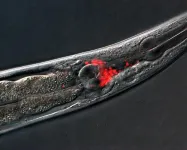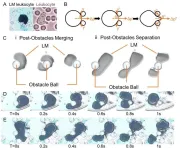(Press-News.org) Paramedics in England are experiencing wide-ranging challenges in responding to the increasing number of end-of-life care patients they are being called out to, according to a study from the University of Southampton.
The study published in BMC Palliative Care highlights the issues paramedics face when responding to patients at end-of-life, including a lack of patient information, barriers to administering medication, and insufficient training.
It was funded by Marie Curie and supported by National Institute for Health and Care Research (NIHR) Applied Research Collaboration Wessex.
An ageing population coupled with shortfalls in community healthcare services is placing an increasing reliance on paramedics to deliver care during a patient’s last year of life.
Dr Natasha Campling, Associate Professor at the University of Southampton and lead author of the paper says: “Often ambulance paramedics respond to acute conditions via 999 calls where their role is to preserve life, treating patients quickly on scene to stabilise them so they can then be transferred to hospital.
“For patients at end of life, when paramedics are called to scene they need to be able to, for example, distinguish between reversible causes that require hospital treatment and those associated with underlying condition(s) or the dying process that can be relieved through palliative care and appropriate symptom management.
“Our research shows that paramedics are being asked to make such complex decisions without all of the necessary information, support, resources and training to do so.”
Researchers at the University of Southampton conducted an online survey of over 900 paramedics across all 11 NHS trusts employing paramedics in England to understand their experience of delivering this kind of care.
Paramedics frequently attend patients in their last year of life, with 57 per cent estimating that they do so at least every seven shifts, and 89 per cent at least every 14 shifts.
But prior to arrival, 45 per cent of paramedics reported never or rarely knowing the patient’s end-of-life status – just 14 per cent said they often or always knew.
Paramedics regularly lacked access to crucial information, such as patient medical history and advance care planning documents, which state preferences and wishes for care. Frequently, prior discussions around advance care planning had not happened at all.
As such, over half of paramedics often or always encountered conflicting views on how best to care for the patient, for example between the crew, family members and the GP. Paramedics found it difficult to challenge another healthcare professional’s recommendation that the patient be taken to hospital if they didn’t think this was the right course of action.
Furthermore, advice from, and referral to other healthcare professionals or teams was problematic, particularly out-of-hours and to community nursing and specialist palliative care teams.
Dr Sarah Holmes, Chief Medical Officer at Marie Curie, said: “We know that pressures on ambulance services are significant, and this study highlights the importance of equipping paramedics with the right tools to do their work.
“Life preservation is their primary role, but this study shows they will also often be faced with palliative care scenarios, too. It is vital that we take the wishes of those at the end of life to heart where at all possible and put robust plans in place to help health care professionals do their jobs, at every step of the process.”
Nearly three-quarters of paramedics reported sometimes or often not having access to specific anticipatory medicines needed to relieve symptoms at end of life. Most ambulance crews don’t carry these so called ‘just in case’ drugs, so they more often come from a patient’s own supplies.
However, authorisation to administer the patient’s drugs is dependent on a Medicines Authorisation and Administration Record (MAAR), which paramedics frequently had problems accessing.
Paramedics also highlighted a lack of pre-registration training in end-of-life care and insufficient continuing professional development in this area.
“Taken together, these challenges have left many paramedics fearful of making the wrong decisions and lacking full confidence in their ability to care for and meet the needs of patients at end of life,” says Professor Sue Latter from the University of Southampton, a co-author on the paper.
The researchers make several recommendations for service improvement, focusing on end-of-life training and education; access to records and documentation; access to referral pathways including 24/7 palliative care advice; and anticipatory medications carried by crews with the authority to administer them.
On improving access to medications, Professor Latter added: “Realistically, it’s likely that paramedics will continue to play an important role in end-of-life care provision and therefore finding effective ways for them to access, supply and administer crucial medicines to end-of-life patients in order to avoid unnecessary conveyance to hospital needs full consideration and evaluation.”
Paramedics providing end-of-life care: an online survey of practice and experiences is published in BMC Palliative Care and is available online.
Ends
Contact
Steve Williams, Media Manager, University of Southampton, press@soton.ac.uk or 023 8059 3212.
Notes for editors
Paramedics providing end-of-life care: an online survey of practice and experiences is published in BMC Palliative Care and is available: https://link.springer.com/article/10.1186/s12904-024-01629-7
For Interviews, please contact Steve Williams, Media Manager, University of Southampton press@soton.ac.uk or 023 8059 3212.
Additional information
About the University of Southampton
The University of Southampton drives original thinking, turns knowledge into action and impact, and creates solutions to the world’s challenges. We are among the top 100 institutions globally (QS World University Rankings 2025). Our academics are leaders in their fields, forging links with high-profile international businesses and organisations, and inspiring a 22,000-strong community of exceptional students, from over 135 countries worldwide. Through our high-quality education, the University helps students on a journey of discovery to realise their potential and join our global network of over 200,000 alumni. www.southampton.ac.uk
www.southampton.ac.uk/news/contact-press-team.page
Follow us on X: https://twitter.com/UoSMedia
About Marie Curie
Marie Curie is the UK’s leading end of life charity.
The charity provides expert end of life care for people with any illness they are likely to die from, and support for their family and friends, in our hospices and where they live. It is the largest charity funder of palliative and end of life care research in the UK, and campaigns to ensure everyone has a good end of life experience. Whatever the illness, we’re with you to the end.
If you’re living with a terminal illness or have been affected by dying, death and bereavement, Marie Curie can help. Visit mariecurie.org.uk or call the free Marie Curie
Support Line on 0800 090 2309 or email support@mariecurie.org.uk
Marie Curie have partnered with the UK Gas Distribution Networks to help give people with a terminal illness the support they need to cope with energy costs. Dedicated Energy Support Officers can provide information on support available from energy suppliers, grants and energy efficient updates. Visit www.mariecurie.org.uk/energy for more information.
Whatever the illness, wherever you are, Marie Curie is with you to the end.
END
Paramedics facing challenging end-of-life care demands
2025-02-13
ELSE PRESS RELEASES FROM THIS DATE:
Worm study shows hyperactivated neurons cause aging-related behavioral decline
2025-02-13
A study of nematodes by researchers at Nagoya University in Japan has found that aging-related decline in brain function is caused by the excessive activation of certain neurons over time, rather than a decline in neuronal activity. This finding, published in the journal Proceedings of the National Academy of Sciences, suggests that interventions aimed at reducing neuronal hyperactivation, such as dietary changes, could potentially mitigate age-related cognitive decline.
Proper brain function occurs when a large number of neurons are connected to each other and work ...
Combining millions of years of evolution with tech wizardry: the cyborg cockroach
2025-02-13
Osaka, Japan – From disaster zones to extreme environments, there remain areas difficult for even humans to reliably access. This poses a problem for search-and-rescue operations, research, surveillance, and more. Now, however, a research team from Osaka University and Diponegoro University, Indonesia is hard at work on one potential solution: the cyborg insect.
Cyborg insects have a lot of advantages over traditional robots. Power consumption is less of an issue, so it’s easier to miniaturize them, and they are even ‘pre-built’ in a sense. However, research on cyborg insects has been limited to simple environments, like flat surfaces supplemented ...
Discrimination can arise from individual, random difference, study finds
2025-02-13
New research from the University of Sydney has found people tend to discriminate in favour of individuals who show a similarity to them, even when the similarity arises from a random event like the flip of a coin.
Published in Proceedings of the National Academy of Sciences, the research runs counter to traditional theories, in particular social identity theory, that assume discrimination occurs because we divide people into groups. It finds, instead, differences between individuals are enough to trigger discrimination.
Previous research (using the seminal ‘minimal group’ experiment) showed participants tend to financially benefit members of their own group over ...
Machine learning boosts accuracy of solar power forecasts
2025-02-13
As solar energy plays an increasing role in the global power supply, ensuring accurate forecasts of photovoltaic (PV) power generation is critical for balancing energy demand and supply. A new study published in Advances in Atmospheric Sciences explores how machine learning and statistical techniques can refine these forecasts by correcting errors in weather models.
Weather forecasts are a key input for PV power prediction models, yet they often contain systematic errors that impact accuracy. Researchers from the Institute of Statistics at the Karlsruhe Institute of Technology ...
Researchers create chemotaxic biomimetic liquid metallic leukocytes with versatile behavior
2025-02-13
Scientists led by Prof. LIU Jing from the Technical Institute of Physics and Chemistry of the Chinese Academy of Sciences (CAS) have created a leukocyte-like liquid metallic entity that vividly simulates various leukocyte behaviors in nature.
Published in Matter on February 10, the researchers demonstrated how these "liquid metallic leukocytes" can autonomously perform complex actions like engulfing foreign substances, changing shape, moving in a pulsatile manner, and even climbing against gravity—showing striking similarities to the dynamic behavior of living cells.
The research ...
Beyond DNA: How environments influence biology to make things happen
2025-02-13
RICHLAND, Wash.—Curled up inside every single one of the trillions of cells in the human body is six feet of DNA, spooled tightly and carrying the genetic instructions that govern so much of who a person becomes. It’s a nicely wrapped package of instructions for a lifetime.
But having the package in hand is a far cry from understanding how it’s executed.
It’s been 20 years since scientists completed the Human Genome Project, sequencing the entire length of DNA found in a person. Scientists have now done the same with an amazing array of organisms, including some types of worms, mice, mosquitoes, fruit flies, trees, rice and pufferfish.
Science ...
Alarming gap on girls’ sport contributes to low participation rates
2025-02-13
Researchers at Flinders University say there is an urgent need to encourage more girls to participate in sports, following a new study that reveals a striking lack of research on girls' sport engagement.
A new study in Sport in Society journal set out to review existing data on interventions to engage female adolescents in organised sport, and to explore the different factors that influence their experience and decision making in sport.
“Despite a rigorous systematic search of more than 3,000 articles, only five (globally) were found to ...
New study adds to evidence of stroke and heart attack risk with some hormonal contraceptives
2025-02-13
Certain hormonal contraceptives are associated with a higher stroke and heart attack risk, finds a large study from Denmark in The BMJ today that draws on prescription records to give more precise estimates for different products than previous studies.
The highest risk estimates were for oestrogen containing products, in particular the vaginal ring and skin patch.
The researchers stress that the absolute risk remains low, but given the widespread use of these products and the seriousness of these conditions, they say clinicians should consider these potential risks when prescribing them.
Almost 250 million women worldwide are estimated to use hormonal contraception. Previous ...
Can artificial intelligence save the Great Barrier Reef?
2025-02-13
Australian researchers are designing a global real-time monitoring system to help save the world’s coral reefs from further decline, primarily due to bleaching caused by global warming.
Coral reefs worldwide are dying at an alarming rate, with 75% of reefs experiencing bleaching-level heat stress in the past two years.
The World Heritage-listed Great Barrier Reef (GBR), considered the jewel in the crown of coral reefs worldwide and one of Australia’s most significant ecological and tourism assets, has been decimated ...
Critical thinking training can reduce belief in conspiracy theories
2025-02-13
A new study finds that training in critical thinking skills can be effective in counteracting conspiracy beliefs.
Many well-established programmes for reducing people's belief in conspiracies have either no effect or a negative effect.
The study is the first to directly compare different strategies to reduce conspiracy thinking.
A new experimental study has found that fostering critical thinking can be an effective method to reduce people's tendency to believe in conspiracy theories.
Led by researchers at University College Cork (UCC), the ...





